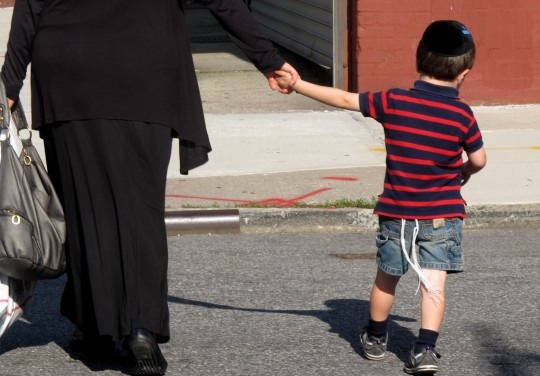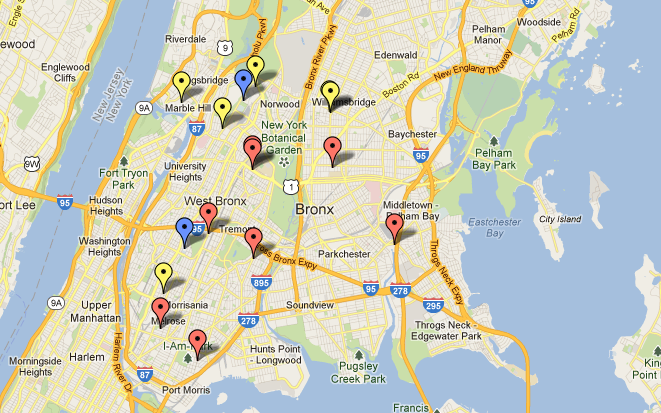
Anyone walking the streets of Harlem at the turn of the last century would likely hear Hebrew and Yiddish spoken in the shops and corner groceries by the large population of newly arrived Eastern European immigrants.
Almost a century later, Spanish has become the prevalent second language in the predominantly black and Latino neighborhood of upper Manhattan, with French claiming third place.
Now a team of educators and consultants at the Hebrew Charter School Center are hoping to bring Hebrew back to Harlem in the form of a dual-language, quasi-public school, part of the organization’s quest to open 20 schools nationwide in five years.
If approved this summer, the school would have its own building and add to over 20 charter schools in the neighborhood, which has the largest concentration of charters in the city. It would also become the fifth Hebrew charter school affiliated with the organization, joining those in East Brunswick, N.J., San Diego, CA, Washington, D.C., and Brooklyn.
If approved by the Regents charter school authorizing board at the State University of New York on June 30, the school would open in August, 2013.
Proponents believe the value of the school is in its strong academic program and its promise to teach a second language rooted in an ancient culture. Critics say the Hebrew language, and the privately run charter school model, will not benefit the surrounding community.
The Hebrew Charter School Center is led by Sara Berman, a former journalist and the daughter of Michael Steinhardt, a former hedge fund manager who has donated millions to Jewish and Israeli causes, according to his Forbes profile and center spokesperson, Dan Gerstein. Steinhardt was the co-founder of Taglit-Birthright Israel, the organization that funds free trips to Israel for young Jewish Americans. He is also head of the Steinhardt Foundation for Jewish Life and the Areivim Philanthropic Group, which created the center.
When the center first decided to build in Harlem, members held a single public meeting with Community Board 10 in March of 2011. Local residents voiced opposition to the school, calling the Hebrew language component an irrelevant addition to the neighborhood. The board’s district manager Paimaan Lodhi said the school has not held another meeting or contacted him since last year’s presentation.
The Hebrew center also reached out to Basil Smikle, Jr., a policy analyst at his private firm, who ran two years ago for New York State Senate representing Harlem and the Upper West Side. Smikle, a professor at Columbia University, had expressed public support for charter schools.
At the group’s request, Smikle traveled to the Brooklyn neighborhood of Midwood to visit its flagship Hebrew Language Academy Charter School. He was surprised to see students speaking Hebrew in the hallways and between class periods.
“I was impressed by the school, impressed by their teachers, and the students looked like they were having a wonderful time,” he said.
According to Principal Laura Silver, students at the Brooklyn school start their day speaking to their instructors in Hebrew over breakfast. During social studies, students focus on Israeli culture and the immigrant groups who now live in the Middle Eastern country.
Many Harlem residents are still opposed to the school coming into their neighborhood. Olaiya Deen, a member of the Community Education Council for the district, said a Hebrew charter school would not support the needs or culture of students in District 3 that spans from West 59th to West 121st Street and parts of Central Harlem.
Dual-language programs in the area should feature Spanish, Deen argued, since much of the neighborhood speaks the language, or Mandarin, which she said would be helpful for careers in trade or finance. The central Harlem part of the districts’ population is 60 percent black and 21 percent Hispanic, according to the U.S. Census.
While she admired the school’s decision not to share a building with another school, Deen said her neighborhood has enough charters. “I strongly, adamantly oppose placing this in District 3 where the charter schools are sucking the blood of our public education system,” she said.
Deen pointed to the area’s five Success Academy Charter Schools, which some parents and educators have accused of overcrowding. In March, parents in District 3 signed a petition to oppose another one of the group’s propositions to expand into a building that currently houses has four other schools on 111th Street and Lenox Avenue.
Hebrew Charter School Center’s Executive Director Aaron Listhaus recognized the high concentration of charter schools in the neighborhood, but pointed out that most of the schools continued to have long waiting lists at the beginning of each academic year.
“Joel Klein recommended this community to us,” Listhaus said of the former chancellor of the New York City Department of Education, who served between 2002 and 2011. “We think we can serve the community this way.”
Smikle, who has advocated for charter schools in Harlem, said the planning committee for the Hebrew language school was trying to break the mold of the average charter schools, which he said “exist in silos” and isolation, by promising to share their curriculum and academic resources with schools and organizations.
So far, the center has partnered with First Corinthians Baptist Church, one of the fastest growing churches in Harlem, and local research organization, the Schomberg Center for Black Studies.
“These partnerships are interesting because they connect us to Harlem,” Smikle said. “Young people in the school are going to be able to learn about Harlem as it was in and how it is now.”
But Deen and others argue that teaching Hebrew naturally goes hand in hand with teaching the Jewish religion and the politics of Israel. Modern Hebrew is spoken by 8 million people worldwide, of which 5 million live in one country, Israel. Classic Hebrew is the most popular language for the Torah and other religious texts.
“To talk about language immersion is to talk about including a community,” Deen said. “People here do not understand how they can employ Hebrew as a practical component of their life.”
Smikle, who studied at the historic black Morehouse College, said the school’s emphasis on Hebrew is not an emphasis on Judaism or Jewish culture. He said knowing the language would also open doors for students in the future since the U.S. and Israel work together in a business, trade and political capacity.
Principal Silver said parents in New York want another dual-language school in the area after hearing the benefits of bilingual learning for their children. She said her school drew people from a range of backgrounds. At the Brooklyn school, 39 percent of the students are black, 3 percent are Hispanic and 2 percent are Asian. The majority of the students are White, but there are no statistics on their cultural backgrounds.
“I think the demographics debunk the myth that only a certain group of people want to learn Hebrew,” said Dan Gerstein, a spokesperson for the center, referring to the racial make-up of the schools. “It’s a little demeaning to ask ‘why Hebrew’?”



Hmmm. Second paragraph was very helpful. Exactly what I was looking for!